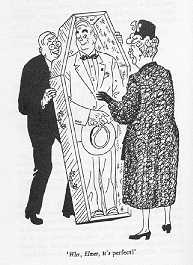Back
to my Literature page
"How to be an alien" (1946) - excerpts
Introduction
This is a chapter on how to introduce people to one another.
The aim of introduction is to conceal a person's identity. It
is very important that you should not pronounce anybody's name in a way
that the other party may be able to catch it. Generally speaking, your
pronounciation is a sound guarantee for that.
...
Once the introduction has been made you have to inquire after the health
of your new acquitance.
Try the thing in your own language. Introduce the persons, let
us say, in French and murmur their names. Should they shake hands and ask:
'Comment allez-vous?'
'Comment allez-vous?' - it will be a capital joke, and will be remembered
till their last days.
Do not forget, however, that your new friend, who is making this
touching inquiry after your state of health does not care in the least
whether you are well and kicking or dying of delirium tremens. A dialogue
like this:
HE: 'How d'you do?'
YOU: "General state of health fairly satisfactory. Slight insomnia
and a rather bad corn on the left foot. Blood pressure low, digestion slow
but normal.'
- well, such a dialogue would be unforgivable.
The weather
THIS is the most important topic in the land. Do not be misled by
memories of your youth,, when, on the Continent, wanting to describe someone
as exceptionally dull, you remarked: "He is the type who would discuss
the weather with you.' In England this is an ever-interesting, even thrilling
topic, and you must be good in discussing the weather.
EXAMPLES OF CONVERSATION
For Good Weather
'Lovely day, isn't it?'
'Isn't it beautiful?'
'The sun...'
'Isn't it gorgeous?'
'Wonderful, isn't it?'
'It's so nice and hot...'
'Personally, I think it's so nice when it's hot - isn't it?'
'I adore it - don't you ?'
For Bad Weather
'Nasty day, isn't it?'
'Isn't it dreadful?'
'The rain... I hate rain..'
'I don't like it at all. Do you?'
'Fancy such a day in July. Rain in the morning, then a bit of sunshine,
and then rain, rain, rain, all day long.'
''I remember exactly the same July day in 1936.'
'Yes, I remeber too.'
'Or was it in 1928?'
'Yes it was.'
'Or was in 1939?'
'Yes, that's right.'
Now observe the last few sentences of this conversation. A very important
rule emerges from it. You should never contradict anybody when discussing
the weather. Should it hail and snow, should hurricanes uproot the trees
from the side of the road, and should someone remark to you: 'Nice day,
isn't it?' - answer without hesitation: 'Isn't it lovely?'
Learn the above conversations by heart. If you are a bit slow
in picking things up, learn at least one conversation, it would do wonderfully
for any occasion.
If you do not say anything else for the rest of your life, just
repeat this conversation, you still have a fair chance of passing as a
remarkably witty man of sharp intellect, keen observation and extermely
pleasant manners.
...
Sex
CONTINENTAL people have sex life; the English have hot-water bottles.
The language
...
Remember that those five hundred words an average Englishman
uses are far from being the whole vocabulary of the language. You may learn
another five hundred and another five thousand and yet another fifty thousand
and still you may come across a further fifty thousand you have never heard
of before, and nobody else, either.
If you live here long enough you will find out to your great
amazement that the adjective nice
is not the only adjective the language possesses, inspite of the fact
that in the first three years you do not need to learn or use any other
adjectives. You can say that the weather is nice, a restaurant is nice,
Mr Soandso is nice, Mrs Soandso's clothes are nice, you had a nice time,
and all this will be very nice.
...
How to be Rude
IT IS easy to be rude on the Continent. You just have to shout and
call people names of a zoological character.
On a slightly higher level you may invent a few stories against
your opponents. In Budapest, for instance, when a rather unpleasant-looking
actress joined a nudist club, her younger and prettier colleagues spread
the story that she has been accepted only under the condition that she
should wear a fig-leaf on her face. Or in the same scity there was a painter
with limited abilities who was a most succesful card-player. A colleague
of his remarked once: 'What a spendthrift! All the money he makes on industrious
gambling at night, he spends on his painting during the day.'
In England rudeness has quite a different technique. If somebody
tells you an obviously untrue story, on the Continent you would remark
'You are a liar, Sir, and a rather dirty one at that.' In England you just
say 'Oh, is that so?' Or 'That's a rather unusual story, isn't it?'
...
Terribly rude expressions (if pronounced grimly) are: 'I'm afraid that...'
'unless...' 'neverheless...''How queer...' and 'I'm sorry, but...'
...
"How to be Inimitable" (1960)- excepts
Journalism or the Freedom of the Press
The fact
THERE was some trouble with the Buburuk tribe in the Pacific Island,
Charamak. A party of ten English and two American soldiers, under the Command
of Capt. R.L.A.T.W. Tilbury, raided the island and took 217 revolutionary,
native troublemakers prisoner and wrecked two large oil-dumps. The party
remained ashore an hour-and-a half and returned to their base without the
loss to themselves.
How to report this event? It depends which newspaper you
work for.
...
Evening standard
(Londoner's Diary"
The most interseting feature of the Charamak raid is the fact that
Reggie Tilbury is the fifth son of the Earl of Bayswater. He was
an Oxford Blue, a first-class cricketer and quite good at polo. When I
talked to his wife (Lady Clarisse, the daughter of Lord Elasson) at Claridges
today, she wore a black suit and a tiny black hat with a yellow feather
in it. She said: 'Reggie was always very much interested in warfare.' Later
she remarked:'It was very clever of him, wasn't it?'
You may write a letter to the Editor of The Times:
'Sir, - In connection with the Charamak raid I should like to mention
as a matter of considerable interest that it was that little Pacific Island
that the distinguished English poet, John Flat, wrote his famous poem "The
Cod" in 1693. Yours, etc...'
...
If you are the London correspondent of the American paper
THE OKLAHOMA SUN
simply cable this:
'Yanks Conquer Pacific Ocean."
On not knowing foreign languages
A TRUE-BORN Englishman does not know any language. He does not speak
English too well either but, at least, he is not proud of this. He is,
however, immensely proud of not knowing any foreign languages. Indeed,
inability to speak foreign languages seems to be the major, if not the
only, intellectual achievement of the average Englishman.
...
Sex
THIS SEEMINGLY most immutable of all social habits changes too -
and changes fast. In an earlier volume of mine - a treatise on the English
character* - I wrote a very brief chapter on this subject. It ran: 'Continental
people have sex life: the English have hot-water bottles.' That was all.
It has now become hopelessly out-of-date. How right was the kind (and to
me unknown) lady who wrote to me in a letter:
'You are really behind the times. In this field, too, things have changed,
and - this is the most important - techniques have advanced. We are using
electric blankets nowadays.'
...
* How to be an alien, by George Mikes, Nicolas Bentley drew the pictures,
Andre Deutsch, 7s6d. Available at all better class bookshops. Order two
copies now.
************************************************************************************************
Back
to my Literature page
"How to be a Yank"-excerpts

THE LANGUAGE
IT was decided almost two hundred years ago that English should be the
language spoken in the United States. It is not known, however, why this
decision has not been carried out.

HOW TO DIE

"Why, Elmer, its perfect!"
THE AMERICAN CENTURY

The position of the American in his own estimation- The curvature of
the earth's surfaces renders it impossible to observe this position without
some distorsion of perspective. The possible margin of error in the above
diagram is about the width of the Atlantic Ocean
But can we trust them as leaders? . . . When I was a small boy we
used to play football every Saturday afternoon in the field ( it would
be called the village green in Eng land ). Our centre forward was always
the same little boy, let's call him Sammy. There was always a great deal
of argument as to who should be in the team and what position one or another
boyshould occupy. But there was never any argument about the position of
the centre-forward. It had to be Sammy. He was not a very good player;
he could not use his left foot at all. But he wanted to play centre-forward
and centre-forward he played. The ball belonged to him.
Back to my Literature page



